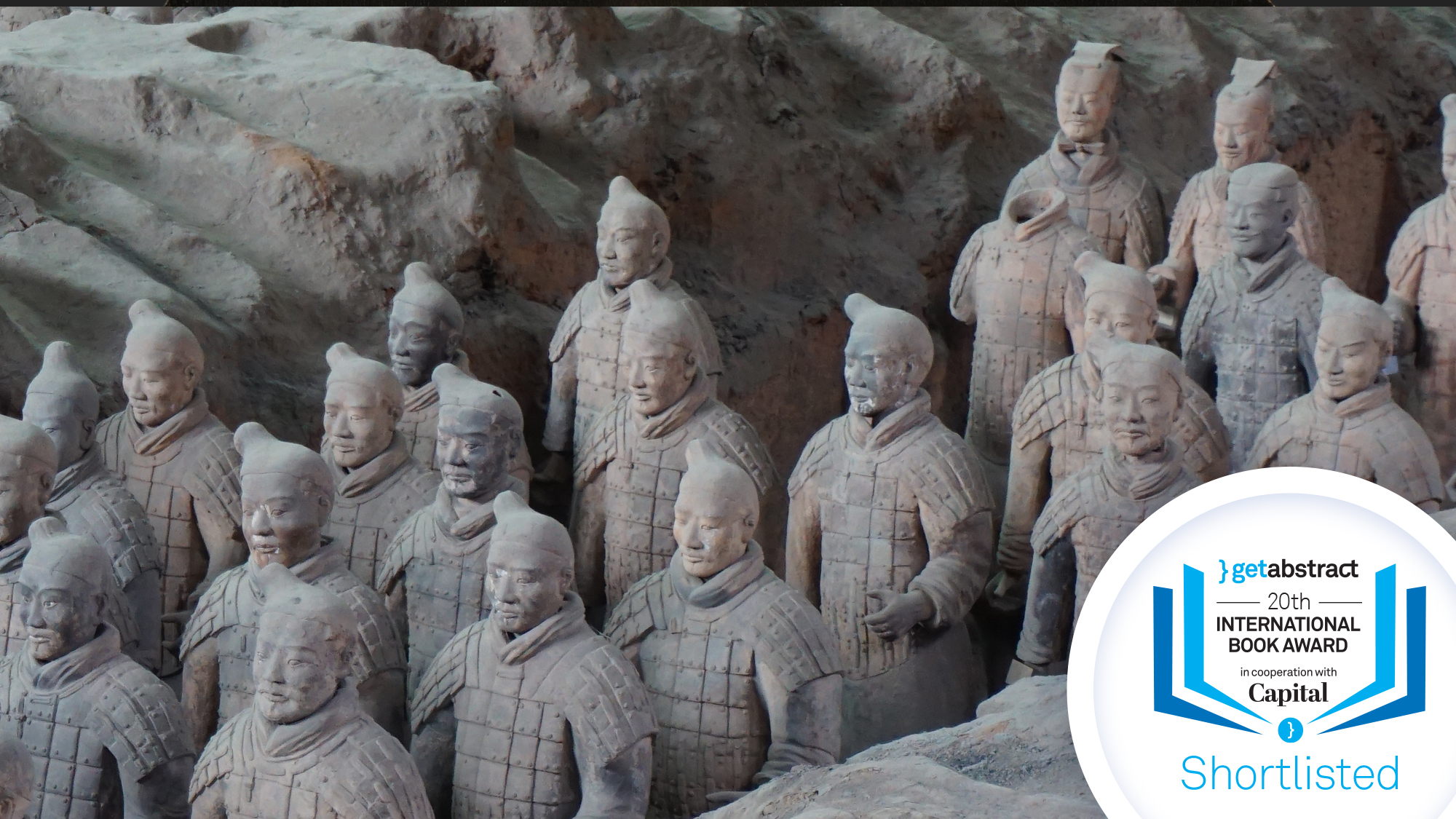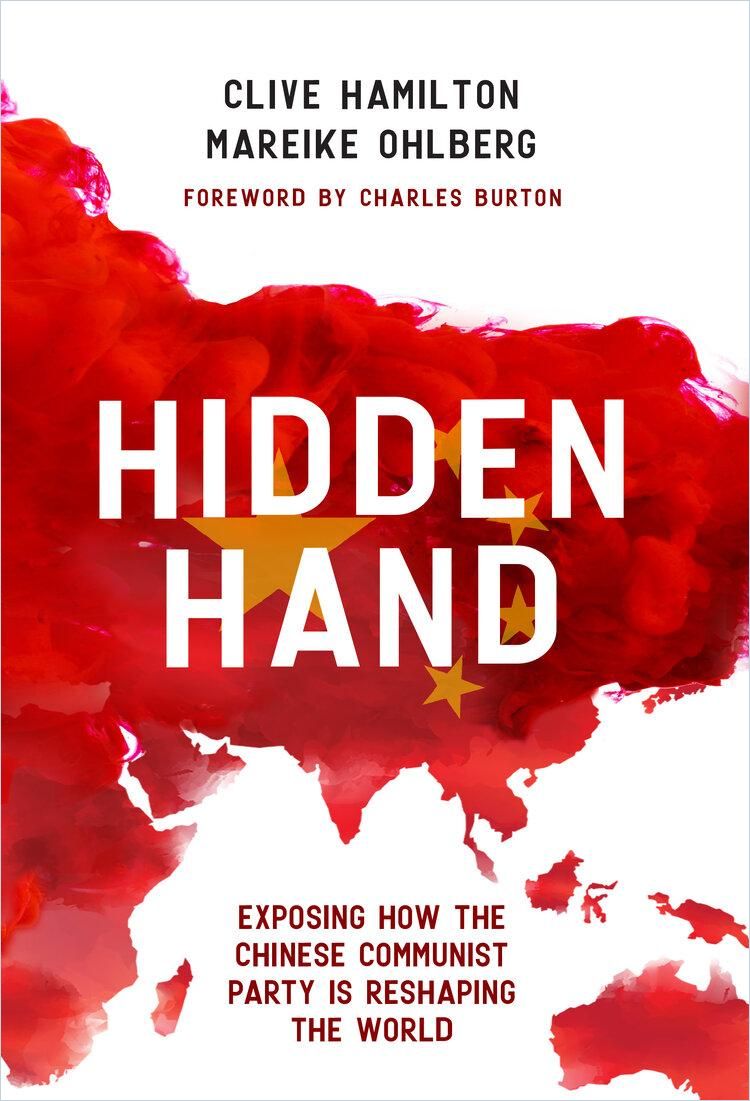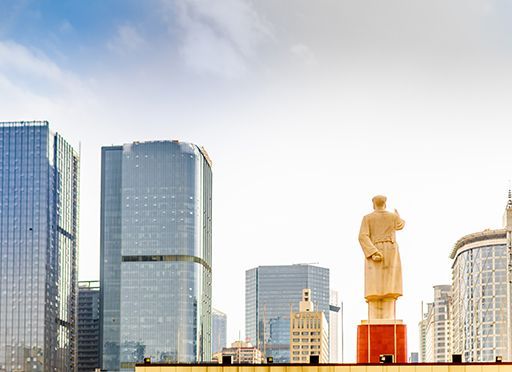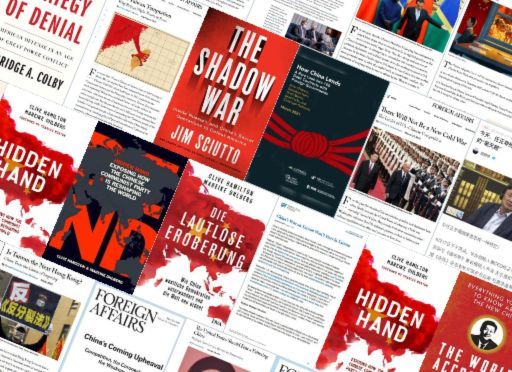“Our Level of Knowledge About China Is Not Sufficient”

Ms. Ohlberg, the gigantic Silk Road initiative, “Belt and Road,” has shown the West how much China has globalized its economic and political influence. But you go one step further with the thesis of your book Hidden Hand that China wants a new world order. What does that new world order look like?
Mareike Ohlberg: The Chinese government wants to transform the world so that it is safer for itself. At present the Chinese Communist Party feels surrounded and in a relatively weak position compared with the world power, the United States, which has alliances everywhere. The ultimate goal is a gradual, long-term change of alliances in the global system. The first step is to get the current partners of the United States to behave neutrally in a conflict between China and the United States and then, in the next step and in the long term, to take China’s side. At present, Beijing mostly relies on bilateral relations in its dealings with other countries, in which China is then generally the larger and stronger country. How realistic a complete reorganization of the world is – so that in the end we have a more Sinocentric world and all countries ideally subordinate themselves automatically and without great encouragement to Chinese interests – is of course open. But the basic approach of at least putting other countries in a neutral position by making them more dependent on China has not worked so badly so far.
The regime likes to present itself as a responsible, benevolent partner – and as a model of the modern world. Did this image suffer in the COVID-19 crisis?
In individual countries like Italy or Serbia, I think China had some success in the coronavirus crisis, for example with mask diplomacy. There, rightly or not, people are angry above all with the EU or the West. In most EU countries, however, I actually see more image damage for China. In this crisis, they have taken on too many players at the same time, in a situation where goodwill was already low. After all, the virus that is causing damage to the economy and life everywhere came from China. But then to stand up and say that if you want our protective equipment, you still have to thank us publicly or meet other conditions – that did not go down well. Turning the emergency into leverage has not gone down well.
And otherwise the party and government leadership is doing things differently?
Usually the Chinese government tries to maintain good relations with most countries, and pick out only one or two countries, with which it then publicly gets it right. This is what happened to Sweden after the Chinese government kidnapped a Swedish citizen from Thailand and tried to stand up for him. Or Norway, after Liu Xiaobo was awarded the Nobel Peace Prize. The Chinese government makes an example of it in such a way that everyone can see it, and then the affected countries and their governments think twice about whether they want to take on the Chinese government.
And in the propaganda battle with the West, China has now lost because of COVID-19? The pandemic has made it clear how China is trying to turn mistakes into success.
The crisis is not over yet and, accordingly, much can still happen. But it can be said that mask diplomacy in Europe as a whole has backfired. The Chinese government has also alienated many African countries after African citizens were mistreated and thrown out of their homes in China.
China has angered many governments at once and many are now talking about it publicly or exchanging views.
Mareike Ohlberg
This is certainly not helpful for the government in Beijing, because normally such threats are made behind the scenes and rarely come to the public.
But China will certainly try to stage itself as the savior of the global economy when an upswing sets in. Won’t the seed then sprout after all?
No, in my view that will not happen. I do not see how. There is not the capacity for it. Of course, people in China are trying to talk up the recovery themselves. But there are problems at every turn. The country will have enough problems to keep itself afloat. Acting as a savior will not happen, and certainly not to the extent that we experienced during the last financial crisis.
This interview was first published in German on capital.de. getAbstract is publishing it here for the first time in English as part of a media partnership with the business magazine for the getAbstract International Book Award 2020.
In Hidden Hand, you speak of economic statesmanship as the sharpest instrument of political influence. You describe how China is winning over decision makers, attracting them with business proposals and investments. Will this continue to work?
The whole world wants to enter the Chinese market, and that of course helps the Chinese government enormously, because it can threaten to punish countries economically. If this factor were to be eliminated, it would be much more difficult for the Communist Party to establish and use networks as successfully as it has done in the past. They would not collapse overnight, but in the long run they would become less effective. But what also counts is to maintain the image. Even today, it is already the case that many countries are much less economically dependent than is often thought.
So has the COVID-19 pandemic thwarted the new world order?
It certainly makes it more difficult. There are too many open variables. The pandemic has also brought China major losses. I certainly don’t see the country as a “winner,” as is sometimes claimed. But the relations between Europe and the United States have deteriorated significantly once again, and that is very good from the point of view of the Chinese government. China did not have to contribute much to this.
So some things have gone “well” for the country; others have gone badly. At the moment, it looks as if the bad ones will prevail.
Mareike Ohlberg
But how the propaganda battle about the pandemic will end is still open – and how much each side will be weakened by it, is also open.
In your book, you want to shake up the reader and create awareness of the extent to which China is infiltrating Western democracies. What are the motives?
It is quite clearly motivated from an inner-Chinese perspective. The party wants to stay in power and sees itself in a situation where this will become more difficult in the long run if China cannot have a stronger international voice. One point that the Chinese government often talks about is its own international “discourse power,” which it feels is too weak.
What does that mean?
The idea behind it is that censorship can keep certain ideas out of China itself, but that in the long run it is actually not a good solution. It would therefore be better if, firstly, ideas that the Chinese government considers dangerous were less recognized internationally, and secondly, if the Chinese political model were to receive more international recognition. If China is the country that sets the discourse internationally and is the most important voice, then there is less to think about at home. Transferred to international relations, this means that it will be much easier to assert one’s own interests when most countries are on China’s side because they have internalized the narratives of the Chinese government. That is the long-term goal.

What do you think of criticism that China has boarded the World Health Organization (WHO) and has already taken over the UN?
Certainly not yet completely taken. But it is quite true that China has built up a strong presence in certain departments and bodies that have been neglected by most Western countries. In the UN there is a relatively large block of countries with which the Chinese government strategically coordinates on agreement, and often asserts itself or can block other initiatives. The WHO has been very accommodating to China in the COVID-19 crisis. It has been very much guided by what China wanted to communicate and has constantly praised China publicly. It won’t have been due to financial contributions; China’s contributions are too small for that. One reason why the WHO has acted in this way is that it hoped to gain better access to the country and to the pandemic’s point of origin, Wuhan, in order to clarify how the disease originated. However, the effect was that the messages that the Chinese government wanted to send were reinforced by the WHO, and this wasn’t positive. And the exact origin of the pathogen still cannot be traced to this day.
Back to infiltration: How is this done systematically to secure influence and alliances?
Very differently. At the international level, for example, alternative international organizations or mechanisms are set up and offered to countries that can become partners. For example, Turkey is in NATO, but can also join the “Shanghai Cooperation Organization,” dominated by China. According to the motto: This is not a contradiction, we are all friends after all.
The Silk Road initiative is not only about trade, but also about geopolitically reorganizing the world.
Mareike Ohlberg
The Chinese government presents the initiative as apolitical, but, in the end, it is of course also about binding the participating countries more closely to China. And the new alliance usually comes at the expense of the old one.
You describe how the CCP’s International Liaison Department maintains party-political contacts and lets politicians make statements that are reinterpreted as support: for example, about the beginning of a “golden era” in relations.
The Communist Party of China has a very well-positioned program of party diplomacy, through which it approaches parties, politicians and elites through various channels. There is not only diplomacy from state to state, but also from party to party. Here the party is not selective – it tries to build relationships with all parties that are, or could become, politically relevant. Young politicians are identified who could possibly be convinced that better relations with China are a good thing. Or those who are out of office. If a government is not convinced by the Silk Road initiative, individual politicians or states can be won over. The Chinese are building up good networks at all levels, which can be used in an emergency to put pressure on the federal or national government.

Since 2001, the getAbstract International Book Award has been presented annually to books that make a particularly important contribution to current economic, social and business-related topics. In this anniversary year, the prize will be awarded symbolically through a series of interviews and digital events. Find out more here.
You often cite the great lack of awareness of Chinese motives for exerting influence – why are they so difficult to identify?
For one thing, our level of knowledge about China is not sufficient. There are not enough people who know both the language and the subject matter. The West has bet on change through trade, like it did with the Soviet Union, and it has worked there. If one does successful business in China, one will not talk about the fact that there may be disadvantages. All in all it was profitable enough that there was no motivation to question the approach. It’s difficult to distinguish between real naivety and naivety that is too profitable to be discarded. It often gets mixed up; and one can’t see inside people’s heads. Where was it naivety, where was the pursuit of profit, where did they talk themselves into something? That cannot be clearly separated. But the effect was the same.
You say the hope for change through trade was disappointed, now the opposite is true. What do you mean by this?
The idea was that China would open up and become more democratic, not only economically but also politically. When I now say that the opposite has happened, of course I do not mean that Europe has closed itself off and we have all turned into autocracies. But:
We can see that Chinese censorship taboos are beginning to take hold here too – for fear of upsetting an important economic trading partner.
Mareike Ohlberg
When you see that a statement or action has “angered” China, others try to avoid it in the future. As a result, China’s government now has some influence on free speech in this country. People are beginning to censor, remove certain works of art from exhibitions, or exclude certain speakers from conferences because they are too “critical.” One begins to see similar speech patterns as those that people in China have long experienced.
But there is still a long way to go from there to undermining the system.
That’s true, but the perceived dependence on China makes it more difficult, even at the political level, to make decisions that the Chinese leadership does not want. Another example is the 5G debate in several Western countries: It seems almost impossible to say that unfortunately we cannot make our 5G network available to a company that is under the influence of a foreign power with which we are not allied. Again, one is terrified of upsetting China and suffering economic losses. In a speech, the Chinese ambassador asked the question, if Germany were to exclude Huawei, how would it be if China were to exclude the German car industry from the Chinese market for security reasons or other standards? He added that of course they would never do that, because that would be protectionism. But since the Chinese government often takes revenge in this way – Canada and Australia are good examples here, as exactly this happened to them – the message has naturally reached the German side anyway. You get involved in something that is not in your own interest at all, because you think you have no other option.
What weaknesses in democracy is China exploiting?
In many respects China uses the same channels as other interest groups and lobbyists. If there were more transparency in Germany or Europe through lobby registers, some things would be much better understood. These are weak points in our system, which have been used by others for a long time and now also by China. There is also the argument that China is deliberately exploiting the openness in Western countries – for example, it can freely use Western media to spread Chinese propaganda, while it is becoming increasingly difficult for European media correspondents to gain access to the country at all. Here, especially in the United States, the calls for reciprocity are getting louder and louder: that means that if Western journalists can no longer go to China, the journalists of Chinese party-state media will no longer receive visas. At the same time we should not try to become too similar to the CCP.
We are damaging our values. And you cannot win against the professional in the field.
Mareike Ohlberg
So we should rather concentrate on closing weak points that arise from a lack of transparency.
Ultimately, every country cultivates its image. Where do you see the tipping point for infiltration?
You mean: What is legitimate or not about China trying to assert its interests? Let’s look at it the other way around: If the German government in China were to systematically work with individual provincial governments to change the policies of the Chinese central government, would that be legitimate? Maybe, but the central government would not like it and would complain about it loudly. The transition is fluid. It is illegitimate where dependencies are threatened with economic or other consequences, or where networks are used to put pressure on individuals. A German-Chinese friendship association is legitimate at first, but if the connection is used to exclude certain speakers at events, or to insist that certain things may not be published, then for me the line is crossed.
Can one detect a subversion or even decomposition of democracy – for example, when it comes to the German debate about Huawei?
Decomposition is a big word and in my opinion it does not apply to Germany. It may be different elsewhere. But we can see from examples such as Huawei that we have possibly gone a step too far, that we are – whether felt or actually – too dependent on a country that is prepared to exercise its economic power to the full.
Is Germany making mistakes with regard to Huawei?
I think so. Even during the Cold War, the Soviet Union would not have allowed us to expand our telecommunications network. Whoever provides the infrastructure gets certain access to data – especially where, as with 5G, hardware and software can no longer be clearly separated. If this is left to a company that is legally and politically obliged to cooperate with another country, then there is a problem. The counter-argument I often hear here – “but the United States does that too” – is nonsensical for several reasons. First, there is a difference between a country with which we are officially allied and a country with which we are not. For another, we have seen that American companies can legally defend themselves against demands from American authorities. Apple, for example, has done this. Ultimately, however, all this is quite irrelevant, because the companies that would alternatively expand the network are European, not American.
The EU Commission now calls China Europe’s system rival.
The consensus on China in Europe has changed since 2016. The country is now viewed much more critically. But China is not only seen as a system rival but also as an important partner. Europe does not want to part with the idea of somehow changing China through commitment. In my view, there is still a lack of awareness that it is incredibly difficult to get the Chinese Communist Party to do something it does not want to do. Perhaps it will be possible to get the Chinese government to sign an agreement. But what do you do if it later fails to abide by the agreement?
How do you assess Beijing’s influence on the EU Commission?
Overall, China’s influence in Brussels is relatively high – not so much on the Commission, but on everything else.
There is hardly an event in Brussels on China that is not financed by the Chinese embassy.
Mareike Ohlberg
At the moment, even the China-skeptics have more of an impact, due to the current circumstances, but one cannot say that China has no friends in Brussels anymore.
You write that in Europe the CCP is particularly concerned about Greece and Great Britain. You write that China is so firmly anchored in the British elites through the “48 Group Club” that the “point of no return” has been passed: Any attempt to escape Beijing’s influence is probably doomed to failure.
In fact, I see elite infiltration in Britain as one of the most advanced in Europe. The interesting thing is that there is an overlap of influence on all elites in business, politics and science. As a result, for years it was considered a consensus that Britain could not survive without China, although the economic dependence is actually not that great.
Can’t anyone who deals with Chinese companies know that they are under the influence of the Communist Party?
That varies. People often know, and it is relatively clear, especially in the economic sphere. Those who do not see the influence probably do not want to see it. In the civil society area, however, I often see real ignorance among all those organizations that have not had much to do with China up to now. Because China is going out into the world much more, actors who have had nothing to do with China so far are now coming into contact with the CCP. If an organization has a company or an NGO that offers exchanges, it is not immediately obvious to those with little experience of China whether it is a party-controlled organization.
Does Europe have a plan for what it should do to counter Beijing’s global ambitions?
Until now, there was hardly any plan for how to deal with China. The West is also divided, and it is becoming increasingly difficult to bring the two sides of the Atlantic together. Coordination and cohesion are more important than ever. Internationally, the Chinese government is relatively successful in playing countries off against each other. We must consider how we can coordinate against attempts to punish partners by isolating them – and not try to profit from it ourselves when it affects another. We need more solidarity here, in Europe and beyond. For example, when you see the Chinese government shooting at Sweden, as has been the case in recent years, you should not think, “Fortunately, it’s them and not me that are affected” but “Next time it can hit me.” If we could create more cohesion, a lot would already have been achieved.
So do we let infiltration take its course?
Solidarity is always a problem and incredibly difficult – whether in the media, civil society, business or politics. I am pleased that a certain awareness of the problem has now been established in many places, and I hope that this will lead to a better strategy.

About the author
Mareike Ohlberg is a senior fellow in the Asia Program of the German Marshall Fund. She is the coauthor of Hidden Hand (with Clive Hamilton), and previously worked at the Mercator Institute for China Studies. Her articles have been published in The New York Times, Foreign Affairs and Neue Zürcher Zeitung.






